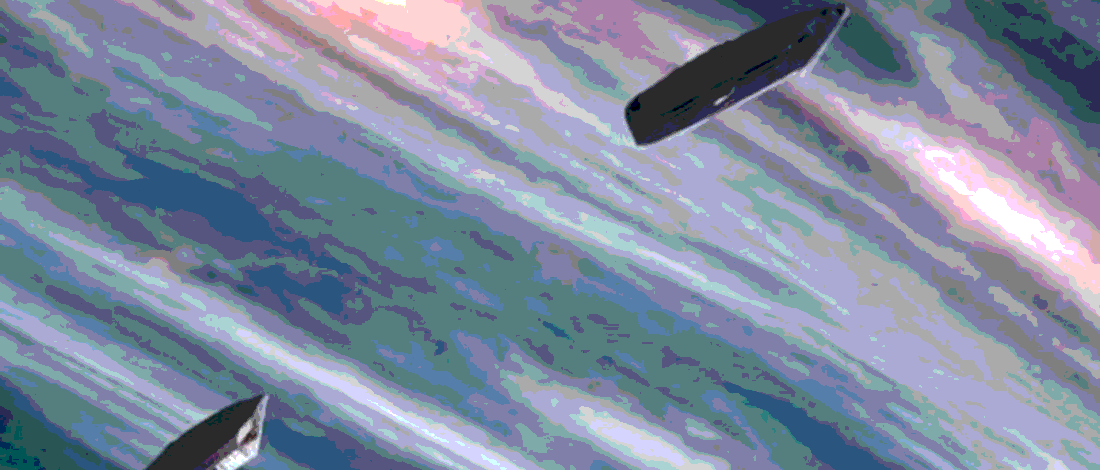
I was twelve years old when the soldiers came to escort us from our home in the Venusian sky.
They came in their gleaming silver-white spaceship, protected even from scratches of space dust by magnetic fields. It touched down onto the blotches of red rust and black patch of our top deck. Their spaceship hadn’t ever had to face a tide of sulfuric rain brought up from a storm in the deep clouds. Ours had been hanging proudly for generations, propped up by balloons.
This gleaming hull opened to reveal the shallow cargo hold that glowed blue and green from the Tela gate inside. Soldiers came out, a short walk through the portal carried them 100 million kilometers from Luna.
Auntie Lou spat on one when he tried to take her by the arm.
The soldier tried to hit her, but their commander yelled at him, “Go get yourself cleaned up before I find you in dereliction of duty for an unkempt uniform!”
The soldier grunted off back to the spaceship.
Cousin Mick whispered to me that the commander was Venusian, too, born on the Marie platform, according to the coded pins on his chest. You never would’ve known from looking at him, since boot camp must’ve straightened out the famous bowlegged stance of someone who grew up on a rocking platform high above the yellow clouds, but he yelled with a bit more breath like we do from a lifetime competing with the wind and thunder below our feet.
The commander turned to the group of us standing on the platform and called in his booming voice, “In accordance with the United Nations Human Rights Council decision, for the greater good of the human population, the Tela Corporation has been granted permission for atmospheric terraformation in the Sol System.”
I looked at Mick, who was looking at Uncle George, who was glaring. This had been all the talk in the forums at school: installing huge Tela gates to drain the N2 on Titan and CO2 on Venus, sucking them through wormholes to fill up the empty skies on Luna, Mars, Mercury, and three Jovian moons. Teachers even assigned homework to show how slick the idea was, how balanced the atmospheres in Sol were, as if God had planned all along for humans to do it. I had to calculate ratios of kilogram masses in ten to the eighteenth power. All Mick had to do was add up percentages.
Nobody in the forums talked much about the people who were already on those worlds, carving out a living through technology and grit in environments that would kill in a second if we let them. Papa and Uncle Frank took a cloud-skimmer to the big protest on Alta, but protests dried up after decision from the UN court, whoever they were. Anyone who posted about it were drowned out in downvotes with comments like “you have to see the big picture” and “don’t be a selfish baby.”
The commander just said, “For your own safety, you are to gather your belongings and proceed through the gate to the awaiting Lunar relocation facility.”
The crowd of us out on deck grumbled like the belly of the yellow clouds below.
“Abandon our platform, you mean,” Uncle Frank called.
Soldiers slapped their hands on the weapons at their hips.
Everyone was quiet after that.
“You will be allowed to return after the completion of the atmospheric terraformation to the land grant provided by the UN accords.”
We looked at one another, but no one said anything. We were all thinking the same anyway: Why did people have to go changing things? Who would care if Venus had blue oceans and green plains, just another copy of Earth? Our platforms were perfectly good.
“Please, line up beside the provided cargo pods for a quick census. We will have you processed and through the gate as smoothly as we can.”
We all shuffled toward the big pile of aluminum crates where all my belongings had been packed, meager as they were compared to the streams from rich kids on Earth.
All except for Auntie Lou. She stood with her arms crossed over her bosom that had fed my aunts, uncles, and dad. The Venusian wind tossed her long, gray hair behind her.
“I ain’t leavin’,” Aunt Lou said as gospel.
The soldiers stood like statues with their hands on their weapons, even though their eyes were wet and noses wrinkled at the sulfur in the air.
Their commander sighed. “Ma’am, I’m sorry, but my orders are that you must be removed. The platforms will be scuttled before the gates open. It’s been deemed too dangerous by the UNHRC.”
“A good pilot could keep ‘em afloat instead of being sucked into one of your gates,” Aunt Lou told him.
“You’ve been compensated for any projected material loss.”
Aunt Lou uncrossed one of her strong arms and waved it out over the horizon of blue sky that rested over the sea of churning yellow deep clouds, separated by the huge red streak of perpetual sunrise. We were floating in the dawn zone, just bright enough we only had a few lights on but not so far into the day that we had to put up the UV shield.
“How?” Aunt Lou asked. “How am I compensated for losin’ this?”
None of us said a word.
The commander shook his head. “Our orders are to escort you to the relocation facility on Luna.”
Aunt Lou sneered. Then she ran. In her wide gait, the same we all had, she bounded across the platform.
“Grab her!” the commander called.
The soldier-statues broke and hurried after Aunt Lou, shouting at her to stop. They had to run with their hands out, skipping from where the platform rolled with the wind. One soldier tripped and fell face-first so he came up with black smudges all up his shiny uniform.
We started whooping.
Aunt Lou didn’t glance back. At the railing, she just picked up one leg and vaulted straight into the sky. Then she was gone over the edge.
We stopped yelling. The only sound was the wailing wind.
The soldiers looked at their commander.
He sighed again. “I’ll fill out the paperwork. Let’s get the rest of them out of here.”
The soldiers herded us so that no one else could make a break for it. We didn’t, though we could’ve.
Anybody living their whole life on a Venusian platform knew that falling from the top deck was the best place to do it, if you had to. You’d fall down past the levels of greenhouses and living pods, each added generation by generation, then to the fat balloons below. You’d catch yourself on the rigging.
Aunt Lou had caught herself. I knew she had to. We’d come back, someday when we’d walk on Venusian soil, and she’d be smiling and waving her big arms next to the crash-landed platform, now a mountain instead of an island.
I just knew it. I could see it.
We didn’t have much living on Venus, just a home among the clouds, which was being taken from us. But we had hope.
Jeff Provine is an English teacher in Oklahoma. He published his first novel, a steampunk space adventure, when he was 19. His works today include nonfiction folklore with local ghost stories, Okie Comics magazine, and numerous anthologies.
Twitter @jeffprovine, FB fb.com/AuthorJeffProvine
Website: www.jeffprovine.com
Amazon author page: https://www.amazon.com/stores/Jeff-Provine/author/B00B8TQUM4

